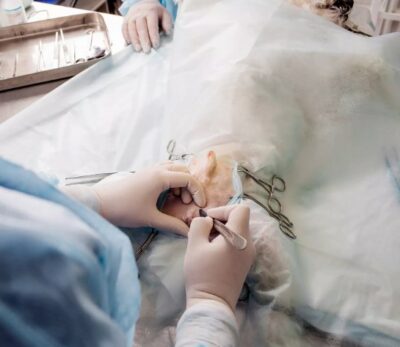Castrations - preoperative and postoperative procedure

If you do not intend to breed dogs, it is best to have your pets neutered. 
It is best to castrate bitches before they go into heat for the first time, but they should be physically developed enough. Each breed of dog develops at a different pace, so the ideal time for castration of bitches can vary between 5 and 10 months. Owners of male dogs usually have their dogs castrated around 6 months of age, although the time for castration also depends on the breed.
Once you have decided to have your "four-legged friends" neutered, you should contact a vet, who will examine your dog and determine important parameters for the operation.
This usually includes the dog's overall health status, body weight and the function of the liver and kidneys, which are crucial for draining anaesthetics from the dog's body. For most veterinary clinics, castration is a routine procedure, so there is no reason for undue concern.
There are a number of rules dog owners must follow when their pet is neutered:
- The dog should not eat 12 hours before the scheduled operation, but should have access to water until the morning of the operation.
- Before surgery, let your dog out to do his business.
- The dog should be clean before castration to reduce the risk of infection as much as possible.
- If you notice any changes in your dog, inform the vet!
Castration procedure
The castration procedure itself usually takes no more than an hour, but it is important that your pet remains in the vet's clinic for some time. This is usually a few more hours, until the animal is fully awake and the vet is sure that everything has gone well.
After castration, dogs often have a few stitches, which are removed later. In addition, an antibiotic spray is often applied to the incision to prevent infection. You can offer your dog water after 6 hours and food after 8 hours. It is important that the dog does not bite or scratch the wound to prevent the sutures from coming loose or microorganisms from entering the wound. Scratching and biting the wound is prevented by using a collar.
 In the beginning, it is necessary to check the castration wound regularly to notice any changes, such as swelling or loosening sutures. Usually, the vet will write a prescription for painkillers in tablet form, which you can give to your dog if needed.
In the beginning, it is necessary to check the castration wound regularly to notice any changes, such as swelling or loosening sutures. Usually, the vet will write a prescription for painkillers in tablet form, which you can give to your dog if needed.
When you take your pet home, you should give it rest and avoid contact with other animals. Owners should also take care that their pets do not run or jump for at least one to two weeks after surgery.
The dog should not be washed for 10 days after surgery. Of course, if you notice any changes such as vomiting, diarrhoea, prolonged lethargy, etc., contact your vet immediately!
If the surgery and post-operative process were successful, your dog should make a full recovery within one to two weeks.
Although rare, unwanted side effects such as incontinence, increased appetite and changes in coat can sometimes occur after castration. Inform your vet if such side effects occur so he can help you treat them.
Castration has numerous positive effects on the health of your pets, plus it prevents unwanted pregnancy in bitches and reduces stray animals.
By adhering to simple rules for pre-operative and post-operative care, we ensure the quick recovery of our pets so that they can return to our daily activities as soon as possible.
